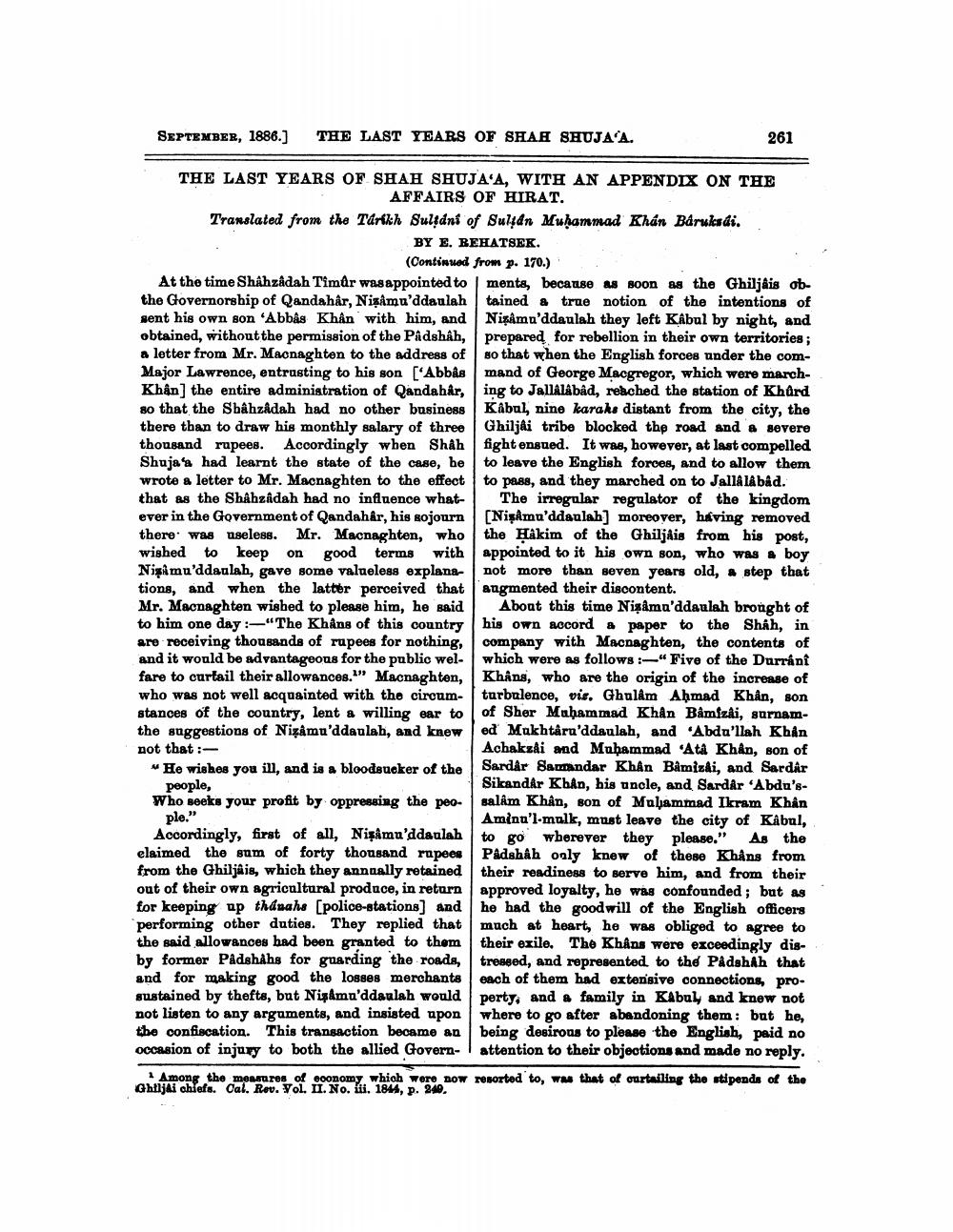________________
SEPTEMBER, 1886.] THE LAST YEARS OF SHAH SHUJA'A.
THE LAST YEARS OF SHAH SHUJAA, WITH AN APPENDIX ON THE
AFFAIRS OF HIRAT.
Translated from the Tarikh Sultáni of Sultan Muhammad Khán Báruksái.
BY E. BEHATSEK. (Continued from p. 170.)
At the time Shahzâdah Tîmâr was appointed to | ments, because as soon as the Ghiljais obthe Governorship of Qandahar, Nizamu'ddaulah tained a true notion of the intentions of sent his own son 'Abbas Khân with him, and Nizamu'ddaulah they left Kâbul by night, and obtained, without the permission of the Pâdshah, prepared for rebellion in their own territories; a letter from Mr. Macnaghten to the address of so that when the English forces under the comMajor Lawrence, entrusting to his son ['Abbas mand of George Macgregor, which were marchKhân] the entire administration of Qandahår, ing to Jallâlâbâd, reached the station of Khurd so that the Shahzâdah had no other business Kabul, nine karaks distant from the city, the there than to draw his monthly salary of three Ghiljai tribe blocked the road and a severe thousand rupees. Accordingly when Shah fight ensued. It was, however, at last compelled Shujaa had learnt the state of the case, he to leave the English forces, and to allow them wrote a letter to Mr. Macnaghten to the effect to pass, and they marched on to Jallâlâbâd. that as the Shahzâdah had no influence whatever in the Government of Qandahår, his sojourn there was useless. Mr. Macnaghten, who wished to keep on good terms with Nizamu'ddaulah, gave some valueless explanations, and when the latter perceived that Mr. Macnaghten wished to please him, he said to him one day :-"The Khans of this country are receiving thousands of rupees for nothing, and it would be advantageous for the public welfare to curtail their allowances."" Macnaghten, who was not well acquainted with the circumstances of the country, lent a willing ear to the suggestions of Nizamu'ddaulah, and knew not that:
The irregular regulator of the kingdom [Nisâmu'ddaulah] moreover, having removed the Hâkim of the Ghiljais from his post, appointed to it his own son, who was a boy not more than seven years old, a step that augmented their discontent.
About this time Nizama'ddaulah brought of his own accord a paper to the Shah, in company with Macnaghten, the contents of which were as follows:-" Five of the Durrânî Khâns, who are the origin of the increase of turbulence, viz. Ghulam Ahmad Khân, son of Sher Muhammad Khân Bâmfzai, surnamed Mukhtara'ddaulah, and 'Abdu'llah Khan Achakzai and Muhammad 'Atâ Khân, son of Sardar Samandar Khân Bâmizki, and Sardar Sikandar Khân, his uncle, and Sardar 'Abdu'ssalâm Khân, son of Muhammad Ikram Khân Aminu'l-mulk, must leave the city of Kâbul, to go wherever they please." As the Pâdahâh only knew of these Khâns from their readiness to serve him, and from their approved loyalty, he was confounded; but as he had the goodwill of the English officers much at heart, he was obliged to agree to their exile. The Khâns were exceedingly distressed, and represented to the Pâdshah that each of them had extensive connections, property, and a family in Kabul, and knew not where to go after abandoning them: but he, being desirous to please the English, paid no attention to their objections and made no reply. resorted to, was that of curtailing the stipends of the
"He wishes you ill, and is a bloodsucker of the people,
Who seeks your profit by oppressing the people."
Accordingly, first of all, Nisâmu'ddaulah claimed the sum of forty thousand rupees from the Ghiljais, which they annually retained out of their own agricultural produce, in return for keeping up thanahs [police-stations] and performing other duties. They replied that the said allowances had been granted to them by former Padshahs for guarding the roads, and for making good the losses merchants sustained by thefts, but Nişâmu'ddaulah would not listen to any arguments, and insisted upon the confiscation. This transaction became an occasion of injury to both the allied Govern
1 Among the measures of economy, which were now Ghiljai chiefs. Cal. Rev. Vol. II. No. iii. 1844, p. 240.
261




